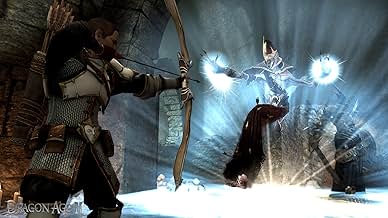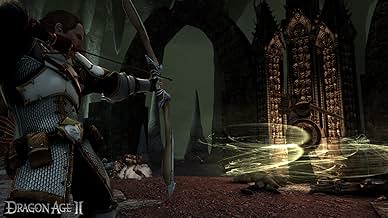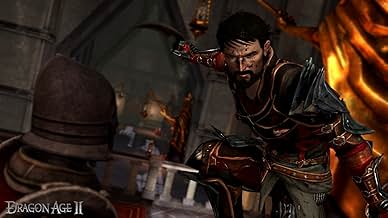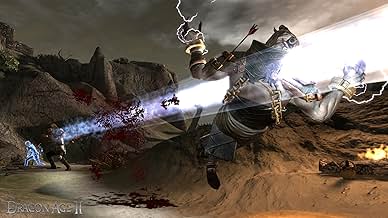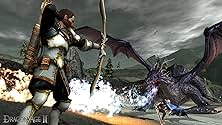Adicionar um enredo no seu idiomaThe medieval world of Thedas is invaded by demonic Darkspawn. Hawke and his family are saved by a powerful mysterious witch Flemeth. They end up in a foreign city where racial, religious and... Ler tudoThe medieval world of Thedas is invaded by demonic Darkspawn. Hawke and his family are saved by a powerful mysterious witch Flemeth. They end up in a foreign city where racial, religious and political tensions threaten to tear it apart.The medieval world of Thedas is invaded by demonic Darkspawn. Hawke and his family are saved by a powerful mysterious witch Flemeth. They end up in a foreign city where racial, religious and political tensions threaten to tear it apart.
- Direção
- Roteiristas
- Artistas
- Prêmios
- 4 indicações no total
- Hawke - Female
- (narração)
- Hawke - Male
- (narração)
- …
- Anders
- (narração)
- …
- Aveline Vallen
- (narração)
- Bethany Hawke
- (narração)
- Carver Hawke
- (narração)
- …
- Fenris
- (narração)
- …
- Isabela
- (narração)
- Varric Tethras
- (narração)
- Additional Voices
- (narração)
- Keran
- (narração)
- …
- Grand Cleric Elthina
- (narração)
- Viveka
- (narração)
- …
- Captain Ewald
- (narração)
- …
- Additional Voices
- (narração)
- Additional Voices
- (narração)
Avaliações em destaque
Although Hawke, the game's protagonist cannot be as well-defined as the protagonist in Origins, having a definitive background allows Hawke to be have the most personal storyline, as opposed to being isolated from the narrative as a savior archetype. Not only that, but Hawke themselves is a very personable character, whose personality can be defined and redefined by the dialogue choices you make, which do have some impact in dialogue and subplots.
Furthermore, restricting the game to a singular location allows you to have a more personable experience with the location, as opposed to simply stopping by for a few hours to save everyone, you experience what life is in Thedas, and you see how the narrative in the world around you progresses.
The narrative, although being my least favorite aspect of this game, especially due to the game's third act and how it handles the overarching conflict, still manages to be immersive - out of every Dragon Age game and DLC, this is the only game that has made me legitimately cry because the game managed to make me care about its more minor characters.
The gameplay is also the most enjoyable in the series. Some do not enjoy the more fast-paced and action packed change of style, but it personally made the game's combat more enjoyable for me - Dragon Age is partially notorious for having rather bland gameplay, and Dragon Age: II provides the most enjoyable combat experience.
Finally, the characters are what truly make this game my favorite of the series. Not only are there practically no restrictions of who you can romance - a win for player-choice and homosexual gamers, but your relationship with the characters is more three-dimensional, as you can either be a friend or a rival to them, and in both instances you can romance the character, leading to a lovey dovey romance, or a toxic relationship. The best part about the new relationship system is how rivalries might actually be better for those characters, as friendships often enable them to do dangerous things, whilst rivalries can prompt a change in perspective.
Dragon Age: II is truly an underrated gem, despite all of its flaws, much like Origins was despite its flaws.
With that said, I have some major gripes with DA2. First, you don't have control over your party members armor. This drives me nuts, and I find this change from the first game inexplicable. Second, and much more confusing is that the world is significantly smaller than Origins. In Origins, you explored a continent filled with castles, caves, mountains, villages, and cities and tunnels under the Earth. The world was diverse and rich with life and history. In DA2, the entire game is in the city of Kirkwall and a few surrounding areas. Third, and the most irritating, is that the game designers reuse the same areas over and over and over. When I found myself in the brothel and then later a noble's house, and they had exactly the same rooms with the same layout, it made me want to punch the game. Not to mention, that you enter 15 different caves, and each cave is simply the same set piece being reused constantly. On top of that, you find yourself running around the same parts of Kirkwall over and over and over and over and over. Thank God that the quests have quite a bit of variety, but at the same time, I found myself wanting a centralized interested story to keep the game moving. Hawke is a fun character, and his/her voice acting is terrific, but again the game finds itself wanting in the plot department. Also, all of the supporting characters are well-developed and easy to care about.
Overall, the game is very well-made. Most of its faults come from comparing it to the first, which again, was a much better game. I expected this game to be an 11/10, but sadly it falls somewhere closer to an 8/10. I will continue to play Dragon Age games, but unfortunately this game put a damper on that desire.
But I decided to give it a chance , and I'm so glad I did . Visuals are stunning , combat animations excellent . But these are not this game's strong points ...
Its all about the story . While the main story is not as inspired as the 1st one , there's a distinct atmosphere built , a personal story of accomplishment , supported by the many many side and companion quests . And your companions feel alive . Voice acting is hands down the best I've seen in a game . Companions have personalities so vivid and perky , that at times I forgot they are just graphics . You can pursue relationships , loose them , there's a full story behind each and every one of them .
Classes are distinct in role and fun while playing them , and I finished this game with all of them . While the storyline is mostly linear , there are some choices that can effect the game strongly , like loosing a member of your family . The dialogs between your party members while you run around are much fun also .
Battles can be as action or as strategic as you like , since you can pause the game to give commands to every party member , or just hack away at enemies . Higher difficulty settings may require you to pause and consider strategy more .
Overall , if you value atmosphere and rich characters , this is a masterpiece .
Anyways, I was absolutely obsessed with Dragon Age: Origins. The rich and epic storyline, emotional depth and involvement of the characters, along with the fantasy-RPG format and gameplay really captivated me to the point that I actually played through the game three times, with the expansion (Awakening) and all the DLC.
How does Dragon Age II compare? They changed aspects that I could see many taking issue with in the first game, such as the combat not being fast-paced enough, and seeming lack of consideration in creating a compelling visual representation of the Qunari.
The combat in DA II is much more fast-paced, and difficulty levels are maintained, and the Qunari are brilliantly depicted as their menacing selves. These changes I can agree with.
What I take issue with is the significantly weaker storyline and limited itemization and customizing options in comparison to DA: Origins. I rather enjoyed being able to meticulously equip and train all of my companions. It is replaced by a general upgrading system that is based on finding character-specific items that party members will automatically add to their existing attire. Accessory items are still interchangeable, but I feel that change was detrimental to the experience.
I realize that consistent itemization is a lot of complicated work for developers, and DA: Awakening suffered slightly in that respect, however I am always against limiting the power of the player when it comes to RPGs.
On the subject of DA: Awakening, the changes to the Runecrafting system for DA II was very welcome. I do not miss the hours spent upgrading runes to fill my equipment.
Concerning the use of characters in DA II, I feel was not bold enough. It seems that attempts were made to present difficult dilemmas for the player to choose from. However, since very few of the characters are even likable, almost all of the decisions were in fact easy to make, or rendered moot. This is likely due to the apparent lack of camaraderie between the central character and his/her companions that was present in DA: Origins, combined with the dialogue of DA II that appeals more to emo subculture than the vast majority of teens and young adults that play fantasy RPGs, and a lack of comic relief in an apparent struggle that seems more commonplace than a time of crisis.
There is an exception to the absence of comic relief in the character Merill, whose neurotic and often clumsy dialogue is a source of entertainment. Also, a couple of short encounters with characters from DA:O were entertaining while they lasted. However, generally the characters are much more severe in DA II than DA:O, when the conflicts and crisis of DA II do not feel as urgent.
I use DA:O and Awakening as a reference point to assess the direction of DA II because, in my opinion, DA II does not function on its own. It requires an understanding of DA:O to assess the successes and apparent failures of DA II.
Having finished both games, I highly recommend that prospective buyers play and finish Dragon Age: Origins, before playing Dragon Age II. If you don't play DA:O, I cannot guarantee that the context of DA II will be totally clear. If you did not like DA:O, you still might like DA II. If you loved DA:O, you won't be as enthused by DA II as you were the first game. It is still a solid fantasy RPG.
8/10. This would be an easy 9 or even 10 if a better effort was made towards the storyline, character development, dynamics between characters, dialogue, and companion itemization. The score is only so high because I believe in giving sequels a fair shake as a standalone item. If I was rating based on my comparisons to DA:O, I would have given it a 6 or 7.
Você sabia?
- CuriosidadesIn Act 1, if you talk to the bartender at The Hanged Man then he may say something about the rapid decline in the pigeon population in Ferelden. This is a reference to Shale from Dragon Age: Origins.
- Citações
Isabela: I spy with my little eye, something that is... red. And socially uncomfortable.
Aveline Vallen: Ugh.
Isabela: No guesses? It starts with A.
Aveline Vallen: Shut up.
Isabela: Ooh, my mistake. It starts with such a B.
Aveline Vallen: Time and a place, Isabela. No games when we're this deep in a mess.
Isabela: Fine. Gone from B to a real C, anyway.
- ConexõesFeatured in Sage Reviews: Dragon Age II (2011)
- Trilhas sonorasDestiny Of Love
By Inon Zur, Idan Reichel, Aubrey Ashburn (as Olivia Orr)
Performed by Aubrey Ashburn (as Olivia Orr)
Principais escolhas
Detalhes
- Data de lançamento
- Países de origem
- Central de atendimento oficial
- Idioma
- Empresa de produção
- Consulte mais créditos da empresa na IMDbPro
- Cor




